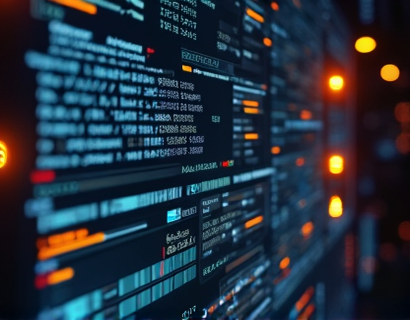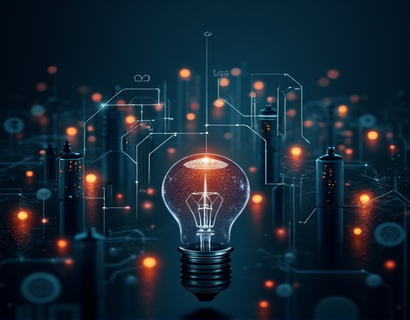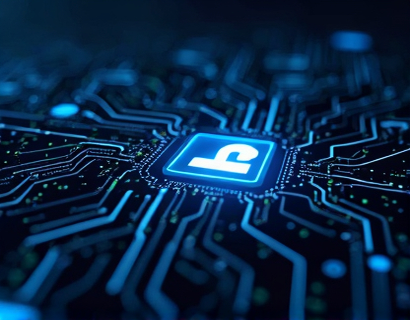Revolutionizing Digital Ecosystems: The Power of AI and Crypto for Enhanced User Experiences
The integration of Artificial Intelligence (AI) and cryptocurrency is transforming the digital landscape, creating more secure, efficient, and engaging user experiences. This synergy is not just a technological trend but a fundamental shift in how digital ecosystems are designed and operated. By leveraging the strengths of both AI and cryptocurrency, tech innovators can unlock new possibilities for user engagement, data security, and economic models that were previously unimaginable.
Understanding the Synergy: AI and Crypto
AI brings intelligence, automation, and predictive capabilities to digital systems, while cryptocurrency introduces decentralization, transparency, and security. When combined, these technologies can create robust, self-improving systems that are resistant to fraud and manipulation. The strategic alignment of AI and crypto can lead to enhanced user experiences through personalized interactions, secure transactions, and transparent data management.
Enhanced Security through Cryptographic Techniques
One of the most significant benefits of integrating AI with cryptocurrency is the enhancement of security measures. Cryptographic techniques such as blockchain provide a decentralized and immutable ledger for transactions, reducing the risk of data breaches and fraud. AI can further bolster security by detecting and mitigating threats in real-time. Machine learning algorithms analyze patterns and anomalies in user behavior and network activity, enabling proactive measures against cyber threats. This combination ensures that user data and transactions are protected, fostering trust and confidence in digital ecosystems.
Personalized User Experiences through AI
AI-driven personalization is a game-changer for user experiences in digital ecosystems. By analyzing vast amounts of user data, AI systems can understand individual preferences, behaviors, and needs. This insight allows for tailored recommendations, customized interfaces, and optimized content delivery. In the context of cryptocurrency, AI can enhance user interactions by providing personalized financial insights, investment advice, and secure wallet management. The result is a more intuitive and user-friendly experience that keeps users engaged and satisfied.
Decentralized Applications and Smart Contracts
Decentralized Applications (DApps) powered by smart contracts are a prime example of the AI and crypto synergy. These applications run on blockchain networks, ensuring transparency and autonomy. AI can optimize the functionality of DApps by automating complex processes, predicting user needs, and enhancing user interfaces. Smart contracts, executed automatically when conditions are met, reduce the need for intermediaries, lowering costs and increasing efficiency. This combination not only streamlines operations but also empowers users with greater control over their digital interactions.
Economic Models and Tokenization
The integration of AI and cryptocurrency is also revolutionizing economic models through tokenization. Tokenization involves representing assets as digital tokens on a blockchain, making them tradable and accessible. AI can optimize token pricing, predict market trends, and manage risk in token-based economies. This approach opens up new opportunities for funding, investment, and reward systems. Users can participate in economic activities with greater ease and transparency, fostering a more inclusive and dynamic digital economy.
Data Ownership and Privacy
In the age of data, ownership and privacy are critical concerns. AI and cryptocurrency offer solutions to these issues by giving users more control over their data. Blockchain-based systems allow users to manage and monetize their data securely, while AI ensures that data is used ethically and efficiently. Privacy-preserving techniques such as zero-knowledge proofs enable secure data sharing without compromising user anonymity. This balance between utility and privacy enhances user trust and satisfaction in digital ecosystems.
Challenges and Considerations
While the potential of AI and crypto integration is vast, there are challenges that need to be addressed. Regulatory uncertainties, technical complexities, and user adoption rates are key factors to consider. Developers and businesses must navigate the evolving regulatory landscape to ensure compliance and foster innovation. Technical challenges, such as scalability and interoperability, require ongoing research and development. Educating users about the benefits and functionalities of AI and crypto solutions is essential for widespread adoption.
Strategies for Success
To harness the power of AI and cryptocurrency effectively, tech innovators should adopt a strategic approach. First, focus on building a strong foundation of security and privacy. Implement robust cryptographic measures and AI-driven security protocols to protect user data and transactions. Second, prioritize user experience by leveraging AI for personalization and intuitive design. Understand user needs and preferences to create tailored interactions that enhance engagement. Third, explore tokenization and decentralized models to create innovative economic systems. Use AI to optimize token economics and manage risks. Finally, stay informed about regulatory developments and engage with the community to drive adoption and trust.
Case Studies and Real-World Applications
Several projects and platforms are already demonstrating the successful integration of AI and cryptocurrency. For instance, certain decentralized finance (DeFi) platforms use AI to automate trading strategies, manage risk, and provide personalized financial services. These platforms leverage blockchain for transparent and secure transactions, while AI enhances the user experience through data-driven insights and automation. Another example is the use of AI in digital identity verification on blockchain networks, ensuring secure and efficient user authentication processes. These applications showcase the practical benefits and potential of AI and crypto synergy.
Future Outlook
The future of digital ecosystems is increasingly intertwined with AI and cryptocurrency. As technology advances, we can expect more sophisticated AI algorithms, improved blockchain scalability, and broader adoption of decentralized solutions. The convergence of these technologies will continue to drive innovation, creating more secure, efficient, and user-centric digital environments. Tech innovators who embrace this synergy will be well-positioned to lead the next wave of digital transformation, offering unparalleled user experiences and opening new frontiers in the tech landscape.










































